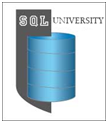I owe my class an apology. Today’s session seems to have been lost in the workload that has been on your professor this week. Alas, this is no excuse and as such, we are here right now and talking about another professional development topic.
Today we are going to discuss relationships in professional development. No, we are not talking about integrity in data. Well, we kind of are. The word integrity and relationships go along with each other. Integrity is quality, lack of corruption and essentially being in harmony. Relationships bring us integrity in our career and skills.
How can relationships help me?
My own career advancement has been significantly assisted with the relationships I have built over the years. My current job I owe to a great friend of mine, Aaron Lowe. That friendship was a relationship built from the SQL Community and key to gaining both new skills and my current position with Magenic. Relationships may or may not grow into friendships and at times they shouldn’t. That isn’t the point of them when we are discussing professional development. Relationships in professional development are there to assist us in becoming better at what we do or what we are pursuing. Don’t take this as a selfish point in which you should use people or even company relationships to feed your own greed. That is the furthest thing from what professional development is. Greed will only bring you highs and extreme lows in your career. The people that show greed may not see it but the ones around them will and relationships are broken.
Creating relationships
A relationship can be created from the following:
When we help others we help ourselves. Helping builds our own skills. Even when that help is a review for us of something already mastered, transferring that skill to others exposes new aspects or thoughts that can enhance the skill. While we do this, a relationship is built with the ones we help. Linkedin contacts are built and skills are made known and exposed to others. This exposure leads to developing our careers.
- Organizing and attending events
The relationship I mentioned earlier was started by organizing a SQL Saturday with the individual. With the trials that come with organizing an event, relationships are built. We expose our skills again to others (and expose weaknesses). Attending these types of events is also a valued way of building relationships. On many occasions I have been asked by friends and acquaintances if they should attend something like a user group or a SQL Saturday. My answer is always yes, absolutely! There is an important part to attending these events though. Networking! Not everyone is outgoing and it can be difficult to jump right into a conversation or walk up to someone and get a conversation going. I can say that if you do make the attempt and even if it takes one or five people before you find the right conversation; relationships will be built from them and hold true for time to come.
- Twitter – Social Networking
Social gathering areas like Twitter, Facebook and such are tools that we as professionals can use to make and strengthen relationships. Twitter has been "The hot" area for this over the last two years. With Twitter, I've made several new relationships and friendships. Keep professional development in mind and make relationships professional as well as relaxed. Just keep in mind the impact things can have if the professional aspect is lost. My co-professor this week, Andy Leonard, dives into the difference between business and community presence. This blog is excellent and points out the key things to keep in mind with social networking. Twitter can be powerful but it can be damaging if you do things the wrong way.
- Work – coworkers
Relationships we build at work last and the impact that they make last longer. With those working relationships, we build and promote our reputation. It's the age old pipe that leads to other unions. Make sure that reputation is how you want to be known. This can backfire in any of these points discussed. If you are abusive even in helping others, even if you are brilliant and a master of many things, it can come back at you. There really is no need to be harsh in life. Yes, we get upset and of all people, your professor is known for snapping. Learn from those mistakes and take a deep breath before standing back in to keep pushing forward.
You can ask me.
I’ve only touched on a few things of how relationships have value to professional development. You can see from these points that there truly is value in making them. Just remember, never abuse them. Any of these relationships may become friendships as you and your career grows. I leave this open in letting all of you know, I am open to any questions you may want to ask about this topic and the others covered. Most SQL Community people are very approachable so take advantage of that.
I’d like to take the time with this topic to thank Aaron Lowe (Twitter | Blog), Andy Leonard (Twitter | Blog), Denis Gobo (Twitter | Blog), George Mastros (Twitter | Blog), Jason Strate (Twitter | Blog), Jonathan Kehayias (Twitter | Blog), Janice Lee (Twitter | Blog) and Erin Stellato (Twitter | Blog) in which I owe thanks for my career and own professional development. Not only do I have a professional relationship with them but many have grown into great friends and I can’t wait for the future growth in all of our careers.







